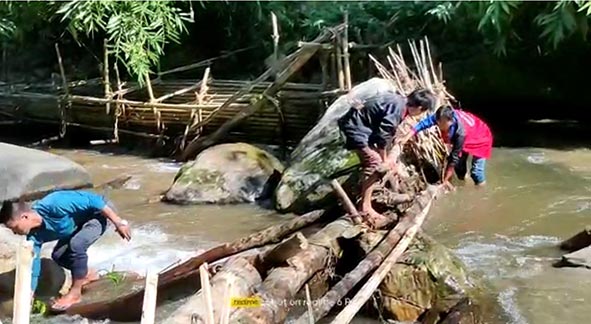Staff Reporter
SEPPA, 7 Nov: In a bid to create a safe passage for the aquatic lives that are escaping from the turbid Kameng river, the youths of Pakoti village in East Kameng district on Sunday dismantled the traditional fishing traps (‘seppe’ in the local dialect) on the Pakoti river.
It is speculated that enormous numbers of fish and other aquatic lives are escaping the Kameng river. The youths have also prohibited any kind of fishing in the Pakoti river till the Kameng river’s water becomes clear.
The Pakoti river is one of the tributaries of the Kameng river in Seppa area.
“The Pakoti area youths are dismantling the seppe (fishing traps) on the Pakoti river, so that fish and aquatic lives escaping from the Kameng river can safely migrate here,” said Krish Tallang.
“We are clearing fishing traps and banning any kind of fishing in the Pakoti river till the Kameng river’s water becomes clear. We appeal to the people to cooperate with the Pakoti youths,” said Sarju Kamsa.
With the Kameng river’s water having turned turbid, it has been reported that aquatic lives are migrating to the river’s tributaries.
East Kameng DC Pravimal Abhishek Polumatla had issued an executive order on 1 November, prohibiting fishing, sale and consumption of fish sourced from the Kameng river.
The DC also appealed to the people to recognize the importance of the aquatic lives of the Kameng river which are under severe distress.
“At the confluence points of the Kameng river and its tributaries, it was observed that fishes were entering the tributaries and swimming upstream to avoid the muddy waters of the Kameng river,” the DC stated.
He expressed anguish that many people were seen fishing extensively in the tributaries of the Kameng river, taking advantage of the increased fish presence.
The DC appealed to the people to “protect and improve the natural environment, including forests, lakes, rivers and wildlife” and to “have compassion for living creatures under Article 51 A (g).”

